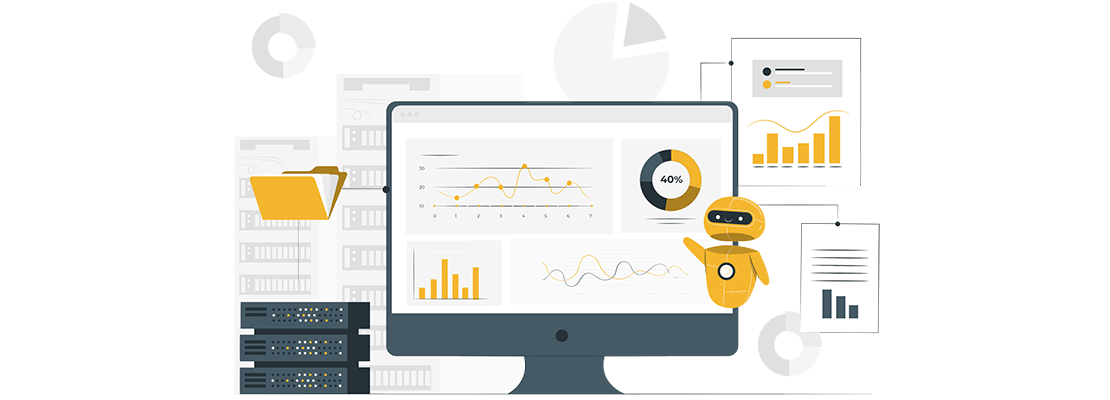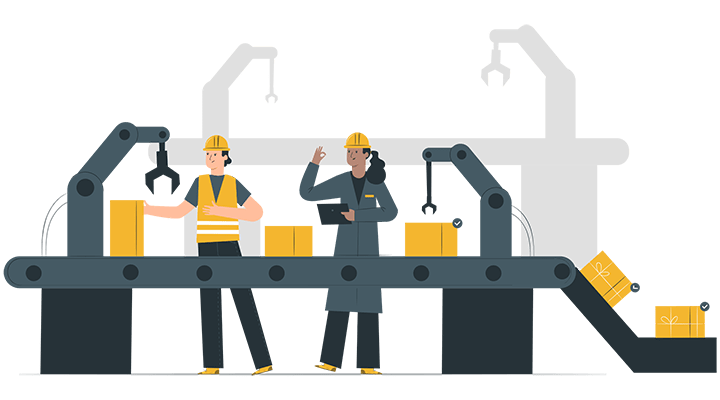
The competition is so tough today that businesses must improve all the time in order to survive. Modern software solutions, such as ERP, CRM, PIM, WMS and many other, allow to optimize and automate business processes. And in case of manufacturing companies, ERP systems run the companies’ lives just as CPU does to a computer. To ensure a full-fledged management, an ERP package must have a specific set of modules.
In this article, we discuss if it is worth buying an ERP system for manufacturers or taking a “raw” ERP tool for its further customization for own needs.
Let’s dive into it!
What is ERP system for manufacturing?
Standard ERP system is a program for automating and managing different processes and the company’s finances. This is an application fitted with a universal company management set of functions.
Manufacturing ERP system is a customized standard ERP solution. It has a basic set of functions and some additional options adjusted for the needs of manufacturing companies. These modules help manage stock and inventory, production processes and final products.
Where is this going?
Every ERP application has to be modified to fit the company’s business processes. And ERP modules for manufacturing industry require adjustments as well. Developers of such software are not able to please everyone, so they usually design a program with basic functionality and later tailor it for the customers.

Benefits and drawbacks of using ERP applications in manufacturing
Using a modern manufacturing ERP system provides a lot of operational and financial advantages on both micro and macro levels. The most notable benefits of ERP software for manufacturing businesses are the following:
- Optimization of manufacturing operations that increases productivity;
- Automation of business processes that improves efficiency;
- Improvement of delivery and shipping, warehouse facilities and inventory management;
- Reduction of risks and raise of confidence about meeting the manufacturing requirements;
- Improvement of customer service by means of an integrated CRM system;
- Fast data exchange among the company’s departments;
- Generation of real-time reports that can be quickly accessed;
- Centralization of operational and financial data that improves visibility and communication.
A manufacturing ERP solution optimizes operations and provides information that drives the company’s development, quality improvement and revenue growth.
Drawbacks of manufacturing ERP software
ERP packages of this kind share the disadvantages of any other system. Basically, there are three major flaws:
- Slow software implementation. It requires binding the already running software and setting up all the processes. This is always a time-consuming process. In one of our articles, we presented a detailed guide on ERP system integration.
- Expensive implementation and further maintenance. However, if you do everything gradually, then these expenses will be less painful for the budget.
- Difficulties with adapting to the new working conditions. Most often, it is experienced by large companies. Employees resist the implementation of ERP systems, as it requires to change the regular work processes.
TOP 3 popular ERP manufacturing modules in U.S.
According to SelectHub, the TOP 3 popular manufacturing ERP solutions are the following:
- Acumatica. An excellent ERP designer with an optimal value for money, suitable for small and medium-sized manufacturing businesses.
- Oracle. One of the most expensive ERP systems on the market. It is a good choice for large manufacturing companies that have enough money to implement it 🙂
- Odoo. Another advanced ERP application that facilitates the manufacturing process. It will do for small companies perfectly.
Popular ERP manufacturing modules
Let’s briefly go through the main modules for manufacturing ERP systems. We will divide them into basic and special ones.
Basic modules contained in every ERP program
- CRM system to manage customer relations. This module is important for marketing and sales department. It helps keep track of communication and document flow with the clients. All the letters, calls, orders and complaints are stored in one database and can be accessed in a few clicks. As for the marketing specialists, CRM allows them to track the results of marketing activities. These may be email newsletters or special offers.
- Inventory control (Warehouse Management System), including raw materials and finished products in the warehouses. It is another basic module that every ERP system contains. The stocks must always be in motion, so that their value does not increase. You also need to monitor expiration dates if you run a food production company. Due to proper inventory control the manufacturer can clear the unnecessary products without throwing them away.
- Order management module makes it possible either to automate or simplify the sales process: billing, shipment, pricing, etc. This module has another important function – purchase planning assistant. When a customer submits an order, the ERP system checks the availability of materials for production, calculates the time frame and notifies you if there is anything missing.
- Financial management module to track daily financial transactions and generate quarterly and annual financial reports. This is an online accounting system that handles the accounts payable, revenue and taxes calculations and pay salaries. It will provide you with an accurate real-time visualization of business activities and productivity.
- Human Resources (HR) module to manage the staff. This is a basic module, in which you can hire employees, send them on vacation, pay salaries and much more. HR module can monitor the quality of each employee. E. g., if one team has been trained and another has not, you can compare their work performance. Then you can decide about the other employees’ training.
- Raw materials order management system to automate purchasing of materials for manufacturing. This module is available in most ERP systems. E. g., in Acumatica you can compare prices and terms of different suppliers.
- Reports, graphs, data analyses – these are the functions of another basic module of any ERP software solution. It is also called a business analytics module. It is capable of tracking every single activity in the ERP system. Based on this, the module automatically generates reports and provides projections.
This list can be continued. In most of the standard ERP packages you will find almost every needed function: inventory management, service management, project management and accounting. But there are some unique modules that are available only in versions for manufacturers.
Special modules for manufacturing ERP systems
- Production management module, which, in fact, is the most necessary module that helps manage all the production processes. It links all business processes, so you can track information about expenses, raw material stocks, etc. A manufacturer can use material specification to differentiate the components needed for production. These components are gathered on the basis of the route or operations statement, and eventually they form a finished product. All these tasks are handled by means of production management module.
- Bill of Material (BOM) to manage the components specification for producing the final product. A bill of materials or management document is a list that includes raw materials, components and other related items needed to assemble a product or service. This list is usually hierarchical, as such structuring allows to establish the order in which materials or components should be purchased. These specifications constitute one of the most important parts of manufacturing industry, as they can help in evaluating all raw materials, components and other materials piecemeal. This is a unique functionality that can’t be found in the basic version of ERP system.
- Engineering module assists manufacturers in maintaining control of master data in production. This module tracks the changes in the bill of materials and routes using a built-in approval workflow to ensure that the product meets current requirements. In this place you can monitor technical changes in specifications and add your own ones, see the versions, etc.
Should I use standard ERP system or customized manufacturing ERP software?
Now we have reached the main question of this article.
Since 2015, FiduciaSoft has been providing services of ERP software customization for both vendors and end users. We adapt ERP program for the customer’s needs in every project. So which option is best: to buy a manufacturing ERP system, or to buy a basic version that will be modified?
There is no definite answer to this question, because all companies have different processes. Some of them need a BOM module, while the other need only an inventory control module. We advise applying the following guide:
- Check out how suitable for your needs the manufacturing ERP solution is. Assess the necessary customizations and the total cost.
- Do the same for the basic version of the chosen ERP package.
- Once you’ve completed the first two estimations, compare the results. It may prove cost-effective to customize a standard ERP program.
When choosing an ERP system, remember that its modification costs may vary a lot. If you want to know how much the ERP optimization for your company will cost, contact Fiduciasoft. We will estimate the scope of work, the time frame and prepare a preliminary quote.
Let’s summarize
In the world where software handles even the most basic tasks, it is simply impractical for businesses to keep using the outdated methods in the field of manufacturing. The manufacturing industry develops rapidly, and even seconds are worth their weight in gold.
Using a manufacturing ERP software solution will not only save resources, but will also increase productivity. If you decide to implement this kind of software, consider all the aspects carefully and entrust this task to a company specializing in ERP systems implementation. This will save your time and often your money.



